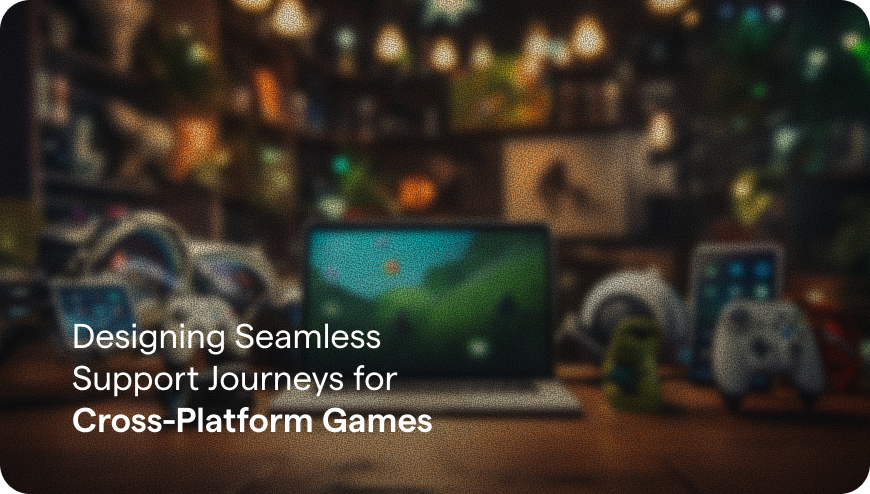In today’s fast-paced gaming industry, every second counts when it comes to player satisfaction. As game developers and publishers strive to deliver immersive experiences, they must also ensure that players receive prompt and effective support.
Automate gaming customer support has emerged as a game-changer, empowering gaming companies to provide swift assistance and resolve issues efficiently. By leveraging advanced technologies like AI, machine learning, and natural language processing, businesses can streamline their support processes and enhance player engagement.
This article explores the world of automated gaming customer support, delving into its benefits, key strategies, and best practices. Discover how you can harness the power of automation to revolutionize your support operations, boost player loyalty, and drive long-term success in the gaming industry.
What is Automated Customer Support in Gaming
Automated customer support in gaming refers to the use of technology-driven solutions to handle player inquiries, resolve issues, and provide assistance without requiring direct human intervention. This approach leverages artificial intelligence, machine learning, chatbots, and intelligent workflows to deliver instant, accurate, and scalable support experiences that meet the unique demands of the gaming industry.
The Difference Between Traditional and Automated Customer Service in Gaming
The evolution from traditional to automated customer service in gaming represents a fundamental shift in how studios approach player support. Understanding these differences is crucial for gaming companies looking to enhance their support operations and meet modern player expectations.
| Aspect | Traditional Customer Service | Automated Customer Service |
|---|---|---|
| Response Time | Hours to days, business hours only | Instant, 24/7 availability |
| Scalability | Limited by agent capacity | Unlimited concurrent interactions |
| Consistency | Variable responses, human interpretation | Uniform, standardized responses |
| Cost Structure | Linear scaling with growth | One-time setup, minimal ongoing costs |
| Personalization | Manual data lookup required | Instant access to complete player profiles |
| Language Support | Requires multilingual agents | Automatic translation and localization |
| Gaming Integration | External channels, gameplay disruption | Seamless in-game support experience |
| Issue Complexity | Excels at nuanced, complex problems | Best for routine and common inquiries |
| Learning Capability | Manual knowledge transfer | Continuous AI-powered improvement |
| Peak Load Handling | Bottlenecks during high volume | Maintains performance under any load |
| Data Analysis | Limited reporting capabilities | Real-time analytics and insights |
| Setup Time | Quick to start with basic training | Longer initial setup, faster long-term deployment |
The transition from traditional to automated customer service in gaming isn’t about replacing human agents entirely, but rather creating an intelligent, efficient system that leverages the strengths of both automation and human expertise. The most effective gaming support strategies combine automated systems for routine inquiries and immediate assistance with human agents for complex problem-solving and relationship building.
Importance of Automated Customer Support in Gaming
In the gaming world, time is of the essence. Players expect quick resolutions to their issues, whether it’s a technical glitch, a billing concern, or a gameplay question. Delayed support can lead to frustration, negative reviews, and ultimately, player churn.
Studies have shown that 67% of players consider customer support a crucial factor in their gaming experience. Moreover, 89% of players are likely to recommend a game to others if they receive satisfactory support. These statistics underscore the importance of providing fast and efficient support to retain players and foster positive word-of-mouth.
What Automation Brings to Gaming Customer Support
Automation revolutionizes gaming customer support by addressing these bottlenecks head-on. Here’s how:
1. 24/7 Availability: Automated support systems operate round-the-clock, ensuring that players can access assistance whenever they need it, regardless of time zone or peak hours.
2. Instant Responses: Chatbots and virtual agents powered by AI can provide immediate responses to common queries, reducing wait times and improving player satisfaction.
3. Scalability: Automated support easily scales to accommodate growing player bases without requiring a proportional increase in support staff.
4. Consistency: By leveraging pre-defined workflows and knowledge bases, automated systems deliver consistent and accurate responses, eliminating the variability associated with human agents.
5. Personalization: AI-driven platforms analyze player data and behavior to provide personalized support, tailoring responses to individual preferences and needs.
Key Support Tasks You Can Automate Today
To get started with automation, consider automating these key support tasks:
1. FAQs and Knowledge Bases: Develop comprehensive self-service resources that address common player questions and issues. Use AI-powered search functionality to guide players to relevant answers quickly.
2. Ticket Routing and Prioritization: Implement intelligent ticket routing systems that automatically assign tickets to the most appropriate support agents based on skills, expertise, and availability. Prioritize tickets based on urgency and impact to ensure critical issues are addressed promptly.
3. Chatbots for Basic Inquiries: Deploy AI-powered chatbots to handle routine inquiries, such as account management, payment issues, and gameplay tips. Chatbots can provide instant assistance, freeing up human agents to focus on more complex cases.
4. In-Game Support: Integrate automated support directly into the game interface, allowing players to access help without disrupting their gameplay experience. Provide contextual assistance based on the player’s current in-game situation.
5. Proactive Support: Leverage AI and machine learning to analyze player behavior and identify potential issues before they escalate. Proactively reach out to players with personalized recommendations and solutions.
Choosing the Right Tools: AI Chatbots, Self-Service, and More
To effectively automate gaming customer support, it’s crucial to select the right tools and platforms. Some essential components to consider include:
1. AI Chatbots: Opt for chatbots that utilize natural language processing (NLP) and machine learning to understand player intents and provide accurate responses. Look for chatbots that can seamlessly hand off complex issues to human agents when needed.
2. Self-Service Portals: Invest in user-friendly self-service portals that offer a centralized hub for FAQs, tutorials, and community forums. Ensure that the portal is easily searchable and regularly updated with the latest information.
3. Automation Platforms: Choose automation platforms that integrate with your existing support systems, such as ticketing software and customer relationship management (CRM) tools. Platforms like Helpshift offer comprehensive automation capabilities, including AI-powered chatbots, intelligent routing, and real-time analytics.
4. Knowledge Management Systems: Implement robust knowledge management systems that centralize and organize support content. Ensure that knowledge articles are easily accessible to both support agents and players.
Measuring Success: Speed, Satisfaction, and Ticket Deflection
To gauge the effectiveness of your automated gaming customer support, track key metrics such as:
1. Resolution Time: Monitor the average time it takes to resolve player issues. Automation should significantly reduce resolution times compared to manual processes.
2. Player Satisfaction: Measure player satisfaction through surveys and feedback mechanisms. Look for improvements in satisfaction scores as you implement automation.
3. Ticket Deflection: Track the percentage of tickets that are successfully resolved through self-service and automated channels. A high deflection rate indicates that players are finding the answers they need without requiring human intervention.
4. Agent Productivity: Evaluate the impact of automation on agent productivity. Automated systems should free up agents to handle more complex cases, leading to increased efficiency and job satisfaction.
Final Thoughts: Building a Future-Ready Support Strategy
As the gaming industry continues to evolve, customer support must keep pace. By embracing automation, gaming companies can deliver the fast, personalized, and efficient support that players demand. However, automation is not a one-time implementation; it requires ongoing refinement and optimization.
Continuously gather feedback from players and support agents to identify areas for improvement. Stay updated on the latest advancements in AI and machine learning to leverage new opportunities for automation. By building a future-ready support strategy that combines the best of human expertise and technological innovation, you can create a support experience that sets your game apart and keeps players coming back for more.
As you embark on your journey to automate gaming customer support, remember that the key to success lies in finding the right balance between technology and human touch. By leveraging the power of AI and machine learning, you can unlock new levels of efficiency, speed, and player satisfaction. If you’re ready to take your gaming customer support to the next level, request a demo to explore how we can transform your customer service operations and help you deliver the exceptional support your players deserve.








